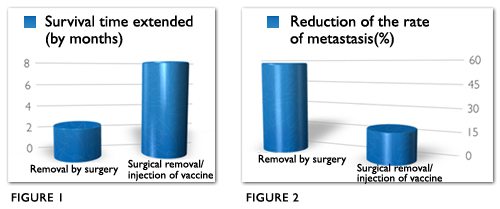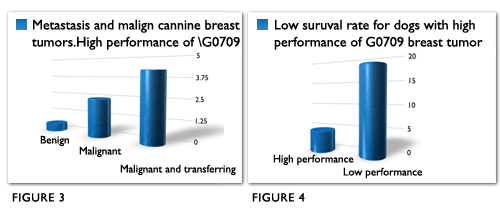|
NTU Animal Cancer Research Center is not only the first research center in Taiwan that integrates basic animal medicine and clinical animal therapy, but also is the first of its kind in Asia. In recent years the Center has achieved many international new breakthroughs in the study of the number killer of cats and dogs—cancer. The Center held a press conference on January 27th, in which the Center announced its two new important discoveries in the treatment of canine oral malignant melanoma and diagnosis of breast malignant tumors.
1.New developments in the treatment of canine oral malignant melanoma
Canine oral melanoma is a fast transferring, highly lethal, and highly aggressive tumor, accounting for 30-50% of oral tumors in dogs, and 70-80% of which are malignant. The traditional treatments include surgery, radiation, and chemotherapy, but the effects of these methods are quite limited, and the survival time after therapy is only 3-6 months. The NTU Animal Cancer announced the results of its "therapeutic vaccine" research, which showed that, if the affected dogs (phase III) received vaccine treatment combined with surgery, the survival time could be extended from an average of 2.7 months with only surgery to 8 months, and up to 10 months or more (figure 1). This is truly an important research achievement.
Dr. R. M. Chu of the Department of Veterinary Science pointed out that the vaccine could stimulate the affected dogs' immunity, kill tumor cells and inhibit their growth, while at the same time reduce the rate of tumor metastasis, significantly improve the quality of living for the affected dogs. More importantly, the vaccine therapy could significantly reduce tumor recurrence and distant metastases(figure 2) and have no clinical side effects for the dogs.
Studies have shown that the incidence rate of canine oral melanoma accounts for only 4% of all malignant tumors, but for oral tumors it accounts for 30-50%, and 70-80% of which are malignant. As the melanoma cells transfer very fast, so the prognosis is often unfavorable. Current treatment modalities include surgery, radiation and chemotherapy, but the effects of these treatments toward malignant solid tumors are quite limited, and the survival time is only 3-6 months.
The new type of vaccine developed by NTU's Animal Cancer Center could effectively cure canine oral melanoma. The new vaccine, derived from fusing dendritic cells with the melanoma, could stimulate the affected dogs' immunity, kill the tumor cells, while at the same time reduce the rate of tumor metastasis and improve the quality of living for the dogs, and extend their lives. As of now the vaccine has been employed in combination with surgery in the treatment of 22 cases of extremely malignant melanoma, and the results have been quite satisfactory. So far the vaccine is one of the better options for treating canine oral melanoma. In the future the Center is committed to improving this treatment method and developing a "dedicated" vaccine for the treatment of dog cancer.

Charts showing the new developments in the treatment of canine malignant oral melanoma 2.New breakthroughs in the prediction of canine breast tumors
In recent years, because of the tremendous improvement in the living environment of animals and of the lifting of qualities for care-taking, the life expectancy of cats and dogs is increased year after year, and the incidence rate of cancer is also increased year after year, to the extent that cancer now occupies the first place in the mortality rate of dogs. For female dogs, tumor, especially breast tumor, occupies higher than 50% of all tumor cases. The NTU Animal Health team announced its breakthrough results in the diagnosis of breast cancer for dogs, which could effectively diagnose canine breast cancer up to 85.7% of accuracy, and diagnose the transfer of breast cancer cells up to 87.5% of accuracy. The research team's achievements in this respect are very conducive to the diagnosis and treatment of breast tumors for dogs. Professor R. M. Chu of the Department of Veterinary Science, who also serves as the Director of NTU's Animal Cancer Center, points out that cancer now occupies 27% of the causes of death for dogs, ranking number one in dogs' mortality rate. Of all the female dogs' tumors, those that derive from breast tissues occupy 52%, and the dogs are usually 10 to 11 years of age. Over 70% of female dogs of these age range develop breast tumors. Therefore, study of breast tumors in dogs is an important area in clinical animal medicine.
Dr. Chu's research team discovered for the first time that G0709 genes are closely related to whether the dogs' breast tumors are malignant or benigh. The performance of the G0709 genes in benigh tumors is extremely low, whereas its performance in malignant tumors is significantly increased, and its performance is even more increased when the tumor is undergoing metastasis.
Also, when the performance of the G0709 genes reaches the apex, the affected dogs' survival time is significantly reduced(figure 4). Therefore, the G0709 genes are very suitable for the diagnosis of whether a dog has malignant tumor, with an accuracy rate of 85.7%, and the rate of accuracy for tumor metastasis can be as high as 87.5%. The G0709 genes are also suitable for deciding whether a dog's breast tumor is malignant or benigh or whether the tumor is likely to undergo metastasis. Clinically the G0709 genes are a source for diagnosis, and in the future the researchers will explore whether the G0709 genes can be applied to the diagnosis of other mammals or they can used as an indicator for target therapy.
The NTU Animal Cancer Center points out that, small animal molecular diagnosis currently is not very widespread, the Center is the only research institute of its kind in Asia. The Center based its research on cooperation with NTU Genomics Center, using the Genomics Center's gene microarray chips and R&D results. The Animal Cancer Center expects to take advantage of the molecular biology technologies to enhance its capability in the early diagnosis of animal cancer, and as important reference data for the choice of treatments.

Charts showing the prediction of dogs' breast tumors |

